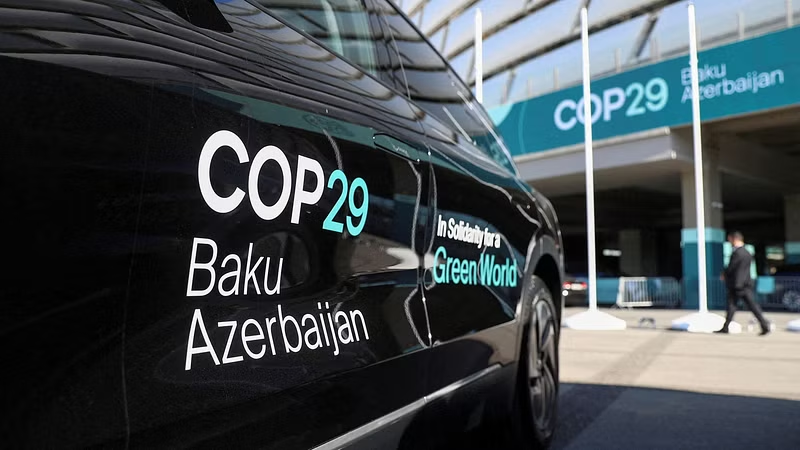The negotiations at COP29 have hit a major roadblock as developing nations rejected the draft climate finance package proposed by developed countries. The text, released early Thursday, failed to address the key issue of financial commitments from wealthier nations, leaving developing countries frustrated and united in their disapproval.
At the center of the debate is the New Collective Quantified Goal (NCQG), a financial framework intended to replace the outdated $100 billion annual target set in 2009. Developing countries argue that the challenges of climate change have escalated dramatically since then, necessitating a much larger commitment—at least $1.3 trillion annually starting in 2025.
The current draft, however, lacks concrete numbers, a glaring omission that has drawn sharp criticism from representatives of developing nations.

Developed nations have yet to officially propose a specific figure, although European Union negotiators have floated numbers between $200 billion and $300 billion annually. For developing nations, these figures fall woefully short of what is needed to mitigate climate impacts and adapt to the increasing frequency of extreme weather events.
READ ALSO: Sacked UNIZIK VC Fires Back at Presidency: “You Can’t Remove Me Through a Press Statement”
Adonia Ayebare, chair of the G77 bloc representing over 130 developing countries, voiced disappointment, stating, “We should not leave Baku without a quantum.” Similarly, Ali Mohamed, chair of the African Group of Negotiators, emphasized that defining the quantum is the main mandate of COP29.
Colombian Environment Minister Susana Muhamad, in an impassioned speech, accused developed nations of prioritizing geopolitics over genuine solutions. “The problem is not that they lack money; the problem is that they are playing games with our future,” she said, earning applause from the plenary.
Representatives from countries like Bolivia, Panama, and Pakistan expressed frustration over the lack of ambition and accountability in the proposed finance package. Bolivian negotiator Diego Pacheco criticized the text for failing to specify financial commitments, while Panama’s negotiator, Juan Carlos Monterrey Gomez, called out the hypocrisy of developed nations.

“Developed countries call our proposal of $1.3 trillion a year ‘extreme and unreasonable.’ What is truly extreme and unreasonable is spending $7 trillion annually on fossil fuel subsidies while we suffer the consequences,” said Gomez.
Pakistan, still grappling with the aftermath of the catastrophic 2022 floods, highlighted the urgency of the issue. “An ambitious outcome on the climate finance package is crucial for us, yet the draft lacks concrete numbers,” they said.
READ ALSO: Man City Set to Offer Erling Haaland a Staggering €120M Contract Extension
The lack of trust between developed and developing nations looms large over the negotiations. The $100 billion target set in 2009 was only met in 2022—two years late—and a significant portion of that funding came as loans rather than grants, adding to the financial burdens of nations already struggling with climate disasters.
Now, developing countries are insisting that most of the funding come directly from public coffers in wealthier nations. They are resisting efforts to rely on private sector contributions, which they argue prioritize profits over accountability.

The U.S. and EU are advocating for a more expansive global investment framework that would draw on both public and private funds. They also want emerging economies like China and Gulf states—classified as developing nations under the outdated 1992 definitions—to contribute, pointing to their economic growth and current global status.
Developing nations see this as an attempt to shift responsibility for historic emissions away from wealthier nations, undermining the principle of “common but differentiated responsibilities” that underpins international climate agreements.
READ ALSO: ICC Issues Arrest Warrants for Israeli’s Netanyahu and Hamas Leaders
The COP29 presidency has acknowledged the widespread dissatisfaction with the initial draft and has invited nations to submit bridging proposals. A revised version, expected Thursday night, aims to find a middle ground by incorporating specific numbers to address concerns.
For developing nations, however, the stakes are too high for compromise without substantive commitments. As Ali Mohamed of the African Group stated, “This quantum is the main mandate for which we are here at COP29.”

The climate finance negotiations at COP29 underscore the widening gap between developed and developing nations. While the former argue for a diversified investment framework, the latter demand concrete, substantial commitments to address the escalating climate crisis.
The outcome of these talks will test the international community’s ability to bridge divides and act in collective interest. For developing nations, the message is clear: the time for vague promises and political maneuvering is over. Real solutions—and real money—are needed now to confront the urgent challenges of climate change.
Discover more from Cine critique
Subscribe to get the latest posts sent to your email.

